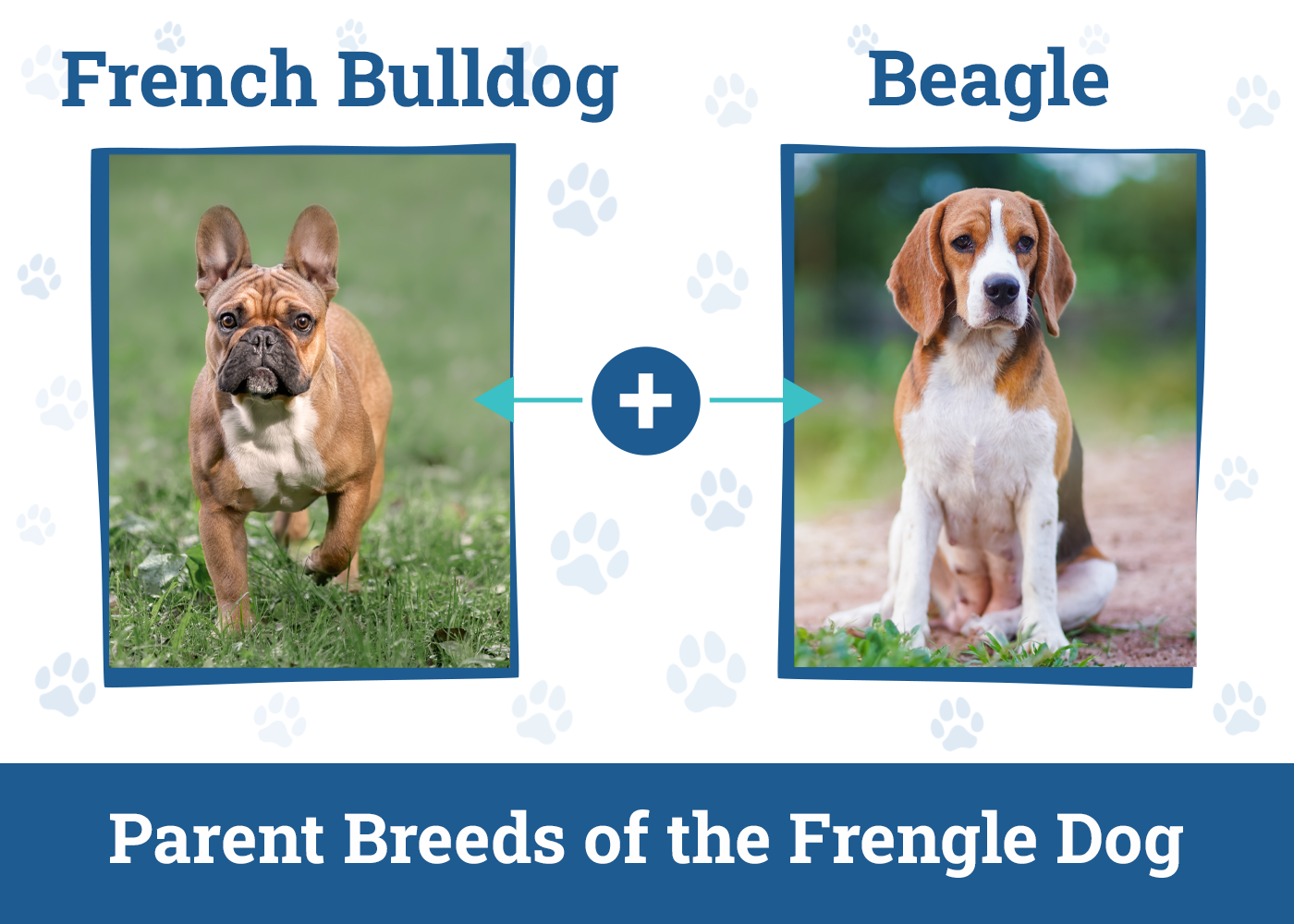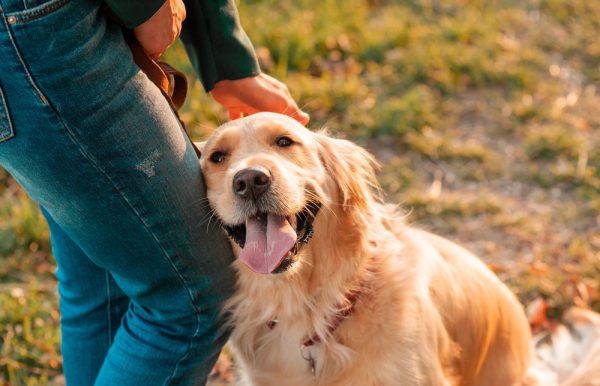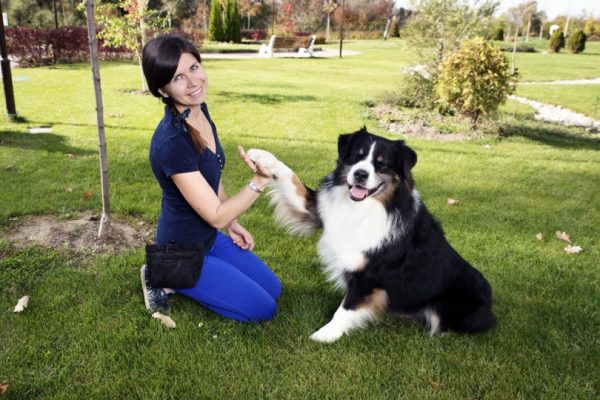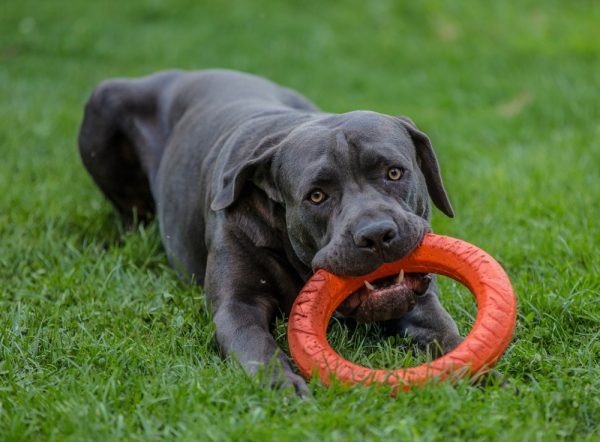In this article
View 8 More +The Frengle, also known as the French Bulldog Beagle, is a cross between a French Bulldog and a Beagle. They make excellent family pets, and they’re affectionate, energetic, and silly. Frengles may have been developed in the United States. Although there’s little information about their origin, you can learn more about them by examining the parents’ traits.
Breed Overview
Height
8–15 inches
Weight
18–30 pounds
Lifespan
12–15 years
Colors
Brown, cream, solid, or mixed variations of black and spotted
Suitable for families
Families with children, seniors, and singles
Temperament
Playful, affectionate, and friendly.
Despite their name, the French Bulldog was first bred in England. The small animals were created as companion dogs. During the Industrial Revolution, some French workers emigrated with their dogs and bred them in France, where they became lapdogs. In the 1800s, the French Bulldog became popular in America, where they got their current nickname, Frenchie.
On the other hand, the Beagle’s earliest reference was in Greece at around 400 B.C. By the 15th century, they were used for hunting in England, but in the 18th century, they were replaced by Foxhounds, which were much faster. Beagles were eventually exported to America and bred as companion dogs. Today, while Beagles are used as sniffer dogs and guide dogs, French Bulldogs are solely companion pets.
The Frengle might be challenging to train because they retain the stubbornness of both parents. However, when trained and socialized early, Frengles are excellent pets. Frengles are short and strong and have short legs and a broad chest. Some of them have the Bulldog’s signature wrinkles. Although some Frengles inherit the French Bulldog’s bat-shaped ears, most have long and floppy ears like the Beagle.
Frengle Characteristics

Frengle Puppies
Frengle puppies are charming, playful, and affectionate. They usually have a short, muscular build and a short snout, similar to the French Bulldog, combined with the longer, droopy ears of the Beagle. They can have several coat colors and patterns, featuring a mix of the parents’ colors.
Frengles are known to get along with children and other animals and are typically good-natured and easy-going. They are also known for their strong hunting instincts and love for adventure. Training and socialization from an early age are important to ensure that your Frengle grows up to be a well-behaved and obedient companion. Overall, the Frengle is a wonderful pet that is sure to bring joy and excitement to your life!


Temperament & Intelligence of Frengle
Frengles are affectionate, intelligent, alert, playful, and social canines. They also make good watchdogs by alerting you when there’s suspicious activity. However, they can also be stubborn if not socialized properly.
They are calm and gentle, which is ideal for families and seniors. When indoors, they love to snuggle with their owners, but they’re wary of strangers until they get used to them.
Are These Dogs Good for Families?
Frengles love running around with children and playing. Therefore, if you have small kids, these playful dogs will enjoy their company. However, young children must learn how to handle them gently, especially when they’re puppies. Frengles with more French Bulldog traits have less energy but will be calm and entertaining for the family. They like being the center of attention, and they don’t like being left alone for extended periods.
Does This Breed Get Along with Other Pets?
Socialization is essential for Frengles. Their hunting origins from the Beagle’s side influence their high prey drive. Therefore, if they are not properly introduced to other pets, such as cats, they’ll chase them around like prey.
Their calm nature makes them less aggressive; therefore, as long as they are socialized, they’ll get along with other dogs and family pets without any issues.

Things to Know When Owning a Frengle
Establishing daily routines and a care plan for your Frengle are vital. You need to plan for their diet and nutrition needs, grooming, exercise, training, and veterinary care.
Food and Diet Requirements
Frengle puppies and adult dogs have different food requirements, but they both need high-quality formulas. They’re energetic little dogs that need 1 or 2 cups of dry dog food daily or the equivalent of wet food. On average, the Frengle’s daily caloric intake should be about 450-480 calories to maintain a healthy weight.
When planning your dog’s diet, you also need to prevent bloating. As a descendant of the Bulldog, they inhale air while eating, which affects their stomach at the end of the meal. If your Frengle has these issues, you can use a slow feeder, increase their feedings but reduce the portions, and prevent them them exercising right after eating.
Your vet can help you develop a healthy diet plan according to their age and health.
Exercise
As a small dog, the Frengle can adapt to apartment living as long as they get enough exercise. Regular exercise plays a vital role in maintaining your pup’s health. In addition, daily exercise keeps your dog happy. As puppies, especially ones with more Beagle traits, they need daily exercise, but they should avoid intense physical activity until they’re more developed. As adults, they need around an hour of exercise a day, including walks and play sessions.
If your Frengle inherits the Beagle’s enhanced sense of smell, they’ll become more distracted by interesting scents and must be on a leash when they’re not in a fenced-in yard. The French Bulldog is calmer than the Beagle, and some Frengles may prefer curling up on the couch than exploring the scents in the backyard. Regardless of their energy levels, Frengles can become loud and destructive when they don’t get enough physical or mental stimulation.
Training
Training a Frengle is moderately difficult. They inherit their stubbornness from the French Bulldog and Beagle; therefore, you’ll need patience and consistency to get them to follow commands. Also, using positive techniques is vital since they’re sensitive canines.
The pup will appreciate treats and rewards, which encourages them to catch up with the training much quicker to please their owner. However, you should avoid scolding them, which can make them tougher to train. Frengles tend to lose their concentration quickly; therefore, training sessions should ideally be 10 minutes long. You can have multiple daily sessions, but they’re unlikely to learn if the training drags on for more than half an hour.
If the home training doesn’t work, professional trainers can help you. Early socialization and reward-based training are crucial for your puppy to understand commands quicker and encourage them to look forward to training sessions.
Grooming ✂️
Frengles are low-maintenance dogs. Their short fur coat needs occasional brushing and a bath only when it’s necessary. They are medium shedders, which is not ideal for people with allergies. Due to their short hair, they are also sensitive to cold weather. During winter, they’ll need protective clothing and possibly booties, depending on the weather conditions.
Frengles should have their teeth brushed regularly to prevent dental issues. Their nails should be trimmed regularly to prevent them from growing into the pads and causing injuries. Their long, droopy ears are prone to ear infections. It’s essential to regularly check for discharge or redness and keep the inside of the ears clean.
If your dog is itchy or scratches their ears often, have them checked by your vet to determine the cause and treat the condition properly.
Health and Conditions
Frengles are vulnerable to the same minor and severe conditions as the parents, including the following:
- Ear Infections
- Cherry Eye
- Entropion
- Hip Dysplasia
- Epilepsy
- Hypothyroidism

Male vs Female
Male and Female Frengles have very slight differences. Males are heavier and larger than females. Females are a bit shy and mature faster, making it easier to train them, whereas male puppies are energetic and naughty.
The environment and upbringing of a dog will affect their personality more than their sex. However, it’s still better to spay or neuter your dog. Neutered and spayed dogs tend to be calm and less aggressive than intact pupss.

3 Little-Known Facts about the Frengle
Here are some interesting facts about the Frengle and their parents.
1. Frengles Can Be Stubborn
French Bulldogs and Beagles are very stubborn canines. The Frengle inherits these traits. While they are very affectionate, they can be hard to train. However, early socialization makes the process much easier.
2. French Bulldogs are Not French
The name of one of the parents is misleading. The French Bulldog was developed in England in a bid to create a tiny English Bulldog. Once the French workers relocated to France during the Industrial Revolution, they refined them and named them after their home country.
3. Frengles Love to Chew
Frengles love chewing more than other dogs. If not socialized early enough, they can become destructive as they grow and destroy everything they encounter.

Summary
Frengles are friendly, affectionate, and playful dogs. As a perfect pet for families, they get along well with children. If properly socialized, they can get along with dogs and other smaller pets. Early socialization is vital due to the high prey drive inherited from the Beagle.
Like their parents, Frengles are still prone to some genetically inherited medical conditions, and it’s vital to adopt one from a breeder who performs health screenings. They love to play and require daily exercise. Training them can be quite a challenge due to their stubbornness, but with the right rewards and patience, you can teach them effectively.
If you are looking for a companion dog with lots of personality, the Frengle might be the ideal one for you.
See Also:
- Cane Corso French Bulldog Mix: Care, Pictures, Info & More
- French Bullweiler (Rottweiler French Bulldog Mix): Pictures, Info & Care Guide
Featured Image Credit: Florian Bender, Shutterstock





















